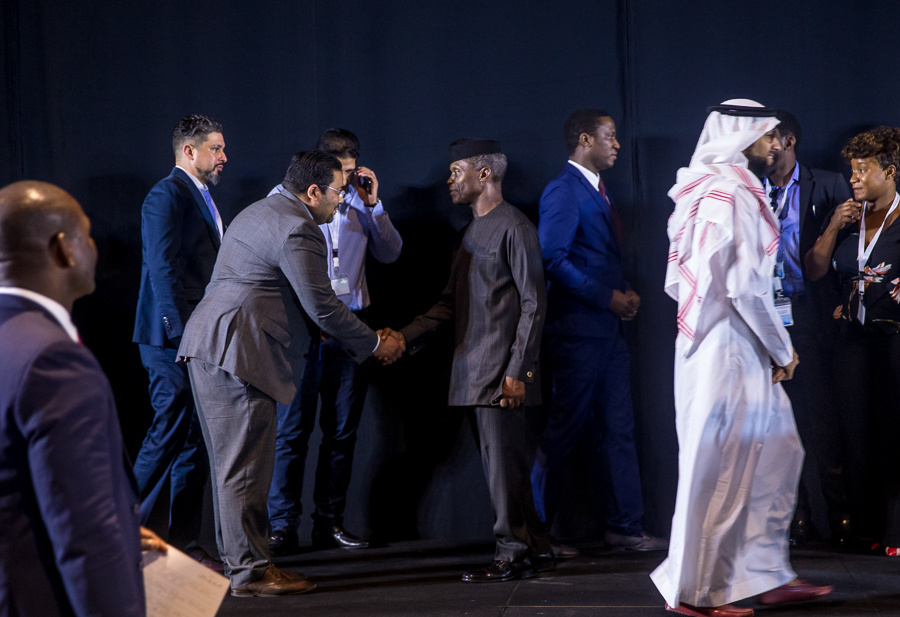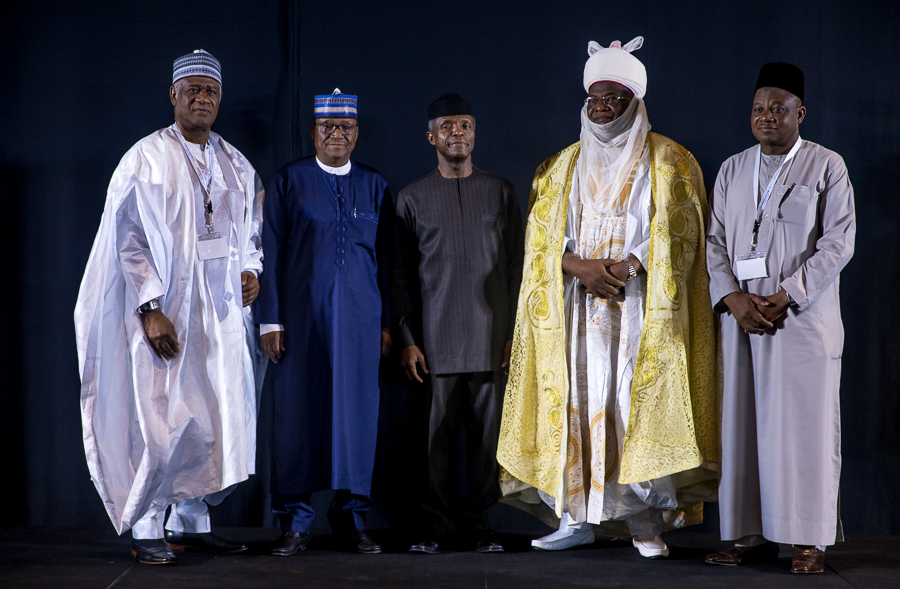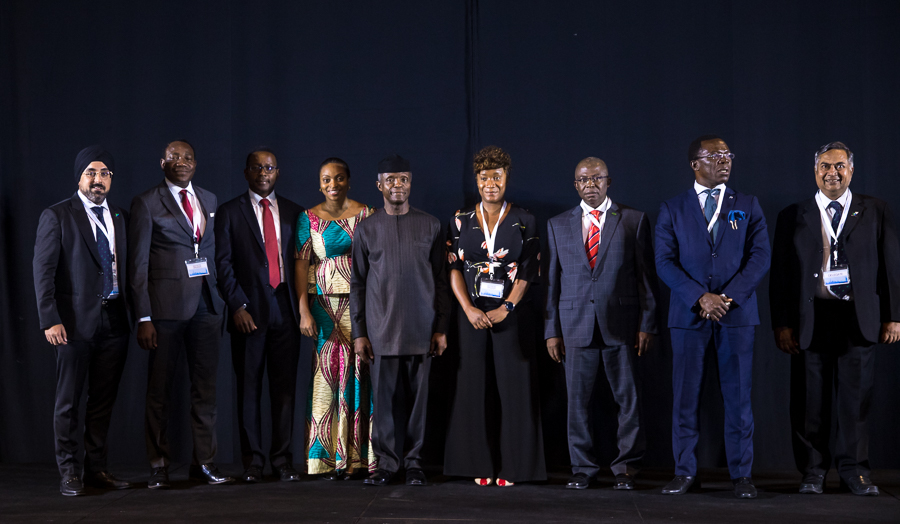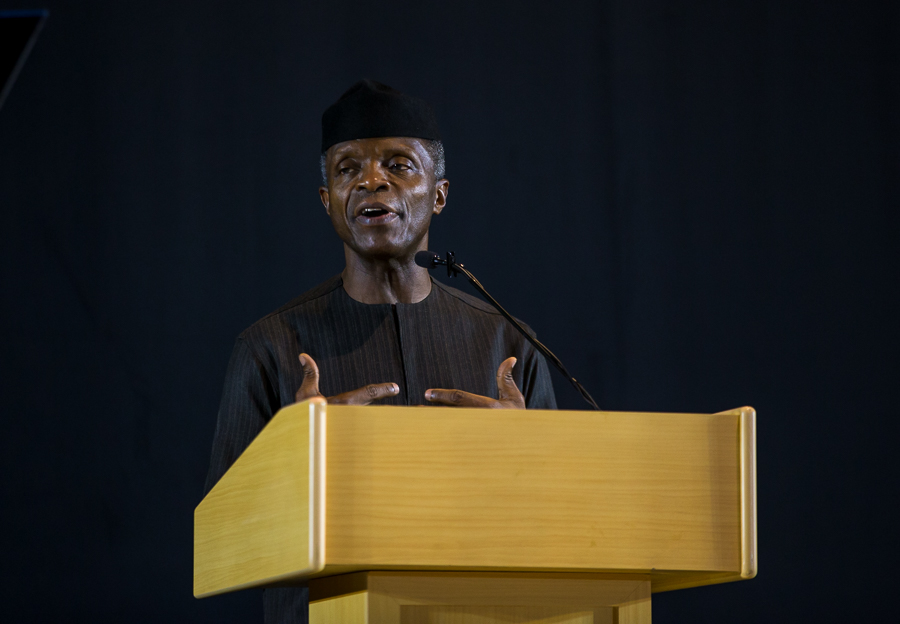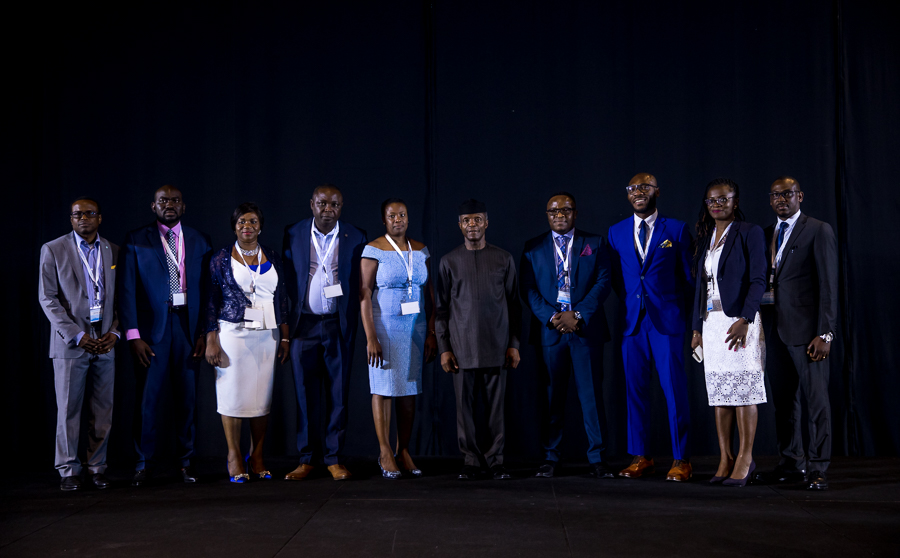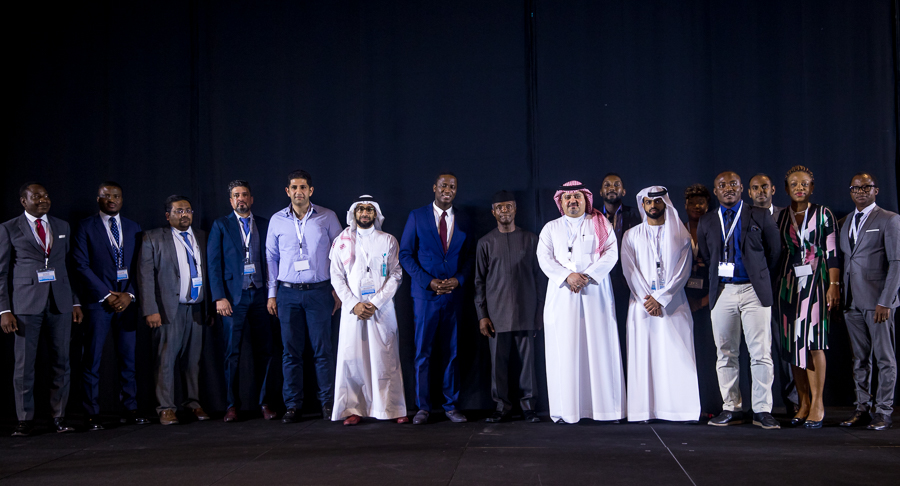CRFI UAE Dubai Professional Business Summit 2018, Tagged “Exploring Investment Opportunities In Nigeria And The UAE”
Continuous Improvement In Business Reforms Show FG’s Commitment To Foreign Investors – VP Osinbajo
**Our overarching goal is to make Nigeria a major global investment destination by continually implementing improvements and reforms in our business environment that will be visible, not merely in our numerical rankings, but in the stories and testimonials of business owners and entrepreneurs across the entire country.
**One of the most important economic policy decisions taken by President Muhammadu Buhari, was to do all that was possible to improve Nigeria’s business environment and attractiveness to investors on an incremental basis. This was critical, especially as we urgently needed to reform our economy to focus on agriculture, manufacturing, services and other non-oil economic activity.
REMARKS BY HIS EXCELLENCY, PROF. YEMI OSINBAJO, SAN, GCON, VICE PRESIDENT, THE FEDERAL REPUBLIC OF NIGERIA, AT THE CRFI UAE DUBAI PROFESSIONAL BUSINESS SUMMIT 2018, TAGGED “EXPLORING INVESTMENT OPPORTUNITIES IN NIGERIA AND THE UAE”, DUBAI ON SATURDAY, 21ST JULY, 2018.
Protocols.
It is indeed, my pleasure to be here with you for the Dubai Professional Business Summit, which I am told, is a platform for discussing beneficial investment and business opportunities on the global scene. I must thank the Christ The Redeemers Fellowship International for the honour of the invitation to deliver this keynote address.
This year’s summit seeks to explore the investment opportunities between the UAE and Nigeria. We already know that a decade ago back in 2008, at the height of the global financial crisis, investors sought out the emerging markets in Africa, as the last investment frontiers, there was a sense of urgency then too, but little traction was gained. That opportunity was lost. However, it seems to me that the next best time to explore those investment opportunities is clearly now. Why? Consider, for instance, the International Monetary Fund’s recent upgrade of the economic outlook for sub-Saharan Africa and the major role that Nigeria’s emergence from a recession, unto positive growth trajectory is expected to play in that regional outlook, the prospects are clearly bright.
In February 2017, the present government of Nigeria, launched the Economic Recovery and Growth Plan (ERGP) 2017-2020. The recovery plan was conceptualized to place the Nigerian economy on the path to stronger, more sustainable and inclusive growth. In Q1 2018, the economy grew 1.95% and is projected to grow by up to 3% over this year, driven by stronger oil prices, stable production, increased non-oil output and foreign exchange availability. Inflation fell 16 consecutive months from 18.72% in January 2017 to 11.60% in May 2018.
Foreign investment, new investment, rose from $908.2m in Q1 2017 to $4.1billion in Q3 2017 over 150% growth from Q1 2017. Total fresh capital inflow in 2017 was $12,228,24billion growth of 138.6% in 2017.
With no restrictions on ownership and guaranteed 100% repatriation of invested funds, a stable foreign exchange market, combined with rising income levels, Nigeria’s external reserves have risen to a four-year high of $47.8 billion on 14 May 2018, up 55% over 15 May 2017, our fundamentals are looking good, and the ERGP is being implemented to keep the economy on the path of sustainable economic growth and global competitiveness.
If you ever have reason to doubt the investment case for Africa, all you need do is look at China with its over US$60 billion worth of investments earmarked for Africa in 2018, a sizable portion of which will be directed at Nigeria from all indications.
I think it bears repeating that the case for investing in Nigeria is a compelling one. And most of us here are already familiar with the story. For instance, as we strive to diversify our economy away from oil, strengthen our institutions and our infrastructure, Nigeria is poised to be the fastest growing African economy and the world’s 14th largest economy by 2050.
This becomes even more compelling as we are the most populous African nation in the world, and by other demographic projections, we are to be the 3rd largest country in the world, by 2050. This means that Nigeria is the consumption demand market and the labour supply market of the future, as far as Africa is concerned and as far as most of the world is concerned.
Therefore, just as Dubai is seen as an attractive business destination, a major transport hub for passengers and cargo connecting the Middle East to the rest of the world. Nigerian cities like Abuja, Kano, Lagos and Port Harcourt are attractive investment destinations for capital, skills and technology, connecting Africa to the rest of the world today and beyond.
Going by trade figures between Nigeria and the UAE, the good news is that there is a lot of headroom for expansion. Nigeria’s capital inflows from UAE were less than $350million in 2017. Today, trade relations with the UAE in the first quarter of 2018 were barely hinged on the importation of a few items such as motorcycles, used vehicles, completely knocked down vehicles (CKD), chemical fertilizers and electrical parts for telephones worth about $49million. So, the possibilities for significantly deeper trade and investments relations must be explored by both countries to harness this potential.
Starting with Aviation, Nigeria has announced the commencement of the process of concessioning its major international airports, with a view to attracting world-class investors and of course, world-class operators. And only this week, we announced our new national carrier – NigeriaAir – which will be owned and run by the private sector, with the government having only a notional 5% stake in that enterprise.
These initiatives are aimed at consolidating Nigeria’s position as the regional hub for trade and investment. Taking our hospitality sector and budding tourism drive as examples, about 1.8million international travellers spend two nights on average at Nigeria’s estimated 10,000 hotel rooms yearly. This generated about $210million in revenue for the industry, which barely reflects on Nigeria’s $500 billion GDP size. Nigeria’s hotel industry alone is projected to grow by double digits up to 2020, as the sector bounces back post-recession to one of the fastest growing in the world, the possibilities for investors is significant.
Major international hotel brands have obviously recognized the enormous opportunity with the likes of the Hilton, Marriott, Westin, Sheraton, Radisson and Best Western, scheduled to open new hotels in Nigeria over the next three to five years.
In real estate, projects such as the Eko Atlantic City project in Lagos which has been dubbed Africa’s “Dubai”, offering 10 million square metres of multi-billion-dollar Grade A real estate investment is also worthy of note.
The project is entirely private sector owned but was supported by both the Federal and Lagos State governments. In June 2016, Lagos state government went into partnership with Dubai Holdings LLC, to build Africa’s first smart city in Lagos, Nigeria. Upon completion, the project is expected to attract several billions of dollars in investments to Lagos; create several thousands of jobs and transform the Ibeju-Lekki axis in particular, and the entire Lagos State in general. The new city will be the world’s first carbon-neutral city.
In Abuja, a real estate development company, The Land of Honey Abuja Development Company, in partnership with the Federal Capital Territory is pioneering Nigeria’s first private new city development project – Land of Honey City, Yanga, Abuja.
The company is poised to deliver a world-class mixed-use new city, occupying a land area of approximately 1,767 hectares. In the same vein, the UAE continues to serve as inspiration for new businesses in Nigeria. The Oceanna Residences, a multi-million-dollar real estate development in Lagos, Nigeria, was designed by the architects behind the famous Dubai Marina.
All these exciting new developments are supported by a thriving construction sector, with steady sources of cement manufactured locally. Aliko Dangote, BUA group, and Lafarge are examples of some of the indigenous cement industries and several other companies like Wapco is also an indigenous company specialized in building materials.
Aliko Dangote is, of course, an excellent example of investments in cement manufacturing in 10 African countries. In 2014, Sovereign fund Investment Corp of Dubai (ICD) bought a 1.4 percent stake in Dangote Cement for $300 million.
It is an open secret that Nigerians love shopping and Dubai is a favourite destination for thousands of Nigerian shoppers, from the popular DEIRA market to your world-class malls.
Similarly, with our teaming population and market size, there are investment opportunities for malls and shopping centres across the country. To buttress this fact, retail space in Nigeria reached 326,958 (sqm) in 2017, compared to 30,000 sqm in 2005.
From just two shopping malls in Lagos and in Abuja 13 years ago, the country now has several malls such as the Palms flagship mall in Lagos, Jabi Lake Mall in Abuja, Ikeja City Mall and Maryland Mall also in Lagos, Novare Malls, Hub Mart, among others in Port Harcourt, Ibadan, Ilorin, Owerri, and Onitsha, all of which are commercially viable in those densely populated cities across the country.
Novare Real Estate Africa, an investment portfolio involved in property development across Africa, has just recently opened its $54million (about N19.4bn) Novare Central mall in Wuse Zone 5, Abuja. Shoprite, a supermarket chain has large supermarkets in 12 States of Nigeria.
This is one of the sectors with great potential when compared to South Africa, Africa’s largest retail economy, with 23million sqm, a lower GDP and a population less than a fourth of Nigeria’s. Little wonder, Mulk Holdings, a UAE business conglomerate, is investing $40million to transform 30,000 square meters of the Lagos National Arts Theatre into a shopping mall.
The Nigerian creative industry, particularly the high-end fashion industry has long had informal links with Dubai, for sourcing of fabric and other clothing inputs.
More recently, in entertainment, one of Nollywood’s highest grossing movies, “The Wedding Party 2”, produced by Nigeria’s renowned entertainment guru, Mo Abudu of Ebony Life, and directed by Kemi Adetiba, is evidence of the successful collaboration between Nigeria filmmakers and Dubai local partners such as Dubai Tourism, Armani, Atlantis, The Palm, Ghaya Grand and Palazzo Versace hotels.
The movie made N73million on opening weekend, the highest record by a Nigerian movie to date, and by Day 5, had earned N100million. Encouragingly, the movie eventually grossed N467million worldwide, making a decent profit of over N170million.
Agriculture perhaps presents one of the best investment opportunities in Nigeria. Only three years ago, we were importing 5million dollars worth of rice daily. Today, we produce 10 million metric tons of paddy rice annually. And we are importing only two percent of our rice consumption now.
Investments in milling capacity have risen astronomically since then, with one investor putting a million tons of milling capacity into the market. Carlos Farms, a Mexican fruit and vegetable investor, had initially planned to grow bananas and pineapples for export, until he discovered that he was making more money selling his bananas locally at $3 dollars a kg, for what he would have been paid only a dollar per kg in Europe. The point of the matter is that, with the sheer size of our population, just serving the local market alone, is a tremendous commercial opportunity all by itself.
With a substantial percentage of the world’s arable land and over half of that uncultivated, it is becoming clearer that the world will be looking to Africa and Nigeria in particular, as its food basket in the coming years.
Just to take China’s demand alone, China has 27% of the world’s population, but only 7% of the world’s arable land for agriculture. China needs 2million tons of hybrid Soya beans per annum for livestock feed and vegetable oil, we have not met that demand, not Nigeria, not anywhere else in Africa.
Sesame seed is also in high demand, about 2million tons per annum is the demand from China. In Vietnam, Japan and Arab countries, sesame seed oil and the cake are used for confectionaries. That demand is largely unmet.
China also requires over 2.3million tons of cassava chips and cassava products for industrial starch, and ethanol and we have not been able to meet that demand, not even the demand for Cocoa.
How about goat meat? 120,000 carcasses of goat meat is required weekly in different countries, especially Arab countries. There is still a major gap in supply here as well. Most of Vietnam’s demand for over 2.5million tons of cashew is unmet. We can export practically all we are exporting today and not even scratch the surface of the demand from that country.
So Nigeria’s role as food provider to the world and especially in the next few decades is clear. It is difficult not to be tremendously successful as an investor in Agriculture in Nigeria. (I am sure that Mr Maduka of Coscharis will be able to say great things about rice investment in Nigeria.)
Similarly, Nigeria’s ICT Sector has attracted numerous international investments with proven successes from Fintech and E-commerce to education, health, media, and logistics. With Dubai being at the cutting edge of both technology as a future city, as well as the financial capital of the Middle East, you are well placed to take advantage of the many opportunities available.
The sector, including communications, accounts for 9% of Nigeria’s GDP and has doubled in size over the past 7 years. With over 163 million mobile phone subscribers, 60% of them actively on the internet and 23million on Facebook, you will agree with me that our ICT sector is one of limitless potential yearning for more investments to propel the sector to an $88billion digital economy over the next 10 years.
In broadband infrastructure, for example, MAIN ONE company, founded by Nigerian-born Funke Opeke, launched West Africa’s first privately owned submarine cable barely seven years ago. The cable was built over a 2-year period and the initial investment of $240million was financed entirely by African investors, and the project broke even in just 2 years after launch.
Today, companies such as Flutterwave, a payment solutions company, Andela a software development engineering company, Jobberman, an online human resource company, and Konga, an online mall, are poignant examples of how young Nigerian entrepreneurs are using technology disruptively to create profit in various business lines. So, both in infrastructure and retail end, there are tremendous opportunities.
And evidently, smart money all over the world is paying attention. For example, Flutterwave saw an investment of 10 million USD, and Konga an impressive $25million, the second biggest amount raised by an African start-up business on the continent. Andela, another of our leading tech brands attracted equity investment from Facebook’s Mark Zuckerberg.
The Lagos Mega City is a shining example of the proven successes and great potential of the ICT sector in Nigeria, with its high quality and relatively lower cost talent, as well as its strong community of incubators, accelerators and development communities. Lagos witnessed over $100million of local and international venture capital fund investments in 2017 alone.
As the government, we are committed to supporting the sector by resolving the known challenges of insufficient digital infrastructure and having the right policy and regulatory framework.
In the technology space, we are deepening broadband connectivity, with over 3,250km of Fibre Optic Cable, laid in the major cities. We have grown from 6% to 22% broadband access in the last two and a half years. We are licensing regional InfraCos to provide open access to the fibre at controlled rates. And we are addressing the right-of-way unstructured taxation challenge through a standardization model.
We are ensuring that because Nigeria is a federation of 36 states, (each of the States to some extent autonomous) we are ensuring that laying fibre optic cables or any other type of infrastructure across State lines, does not mean paying different rates at those State lines. We are ensuring there is a standardization of whatever payment and we have agreed with State authorities to ensure our rates are cheap and affordable so it does not hinder investments.
Our Administration’s strong leadership, committed to good governance, has proved to be critical where our economy has recorded successes as we have demonstrated in recent years that good governance and prudent management of resources means that you can do more with far less. We have, despite almost 60% less revenues, invested over N1.3trillion in capital expenditure, the highest in the nation’s history.
The current wisdom is in letting the private sector invest wherever it can, and in practically any sector of the economy, even in those that once carried the halo of national security assets, such as telecoms and power. Investments are open in any of the various sectors of the economy.
Consequently, we have seen the emergence of dynamic pan-African investors, who on account of their track records are even able to borrow commercially cheaper than Governments. Aliko Dangote’s investment in a 650 thousand barrel a day refinery, subsea pipeline and fertilizer plant is in excess of $16billon.
BUA, a cement and sugar conglomerate, has in the past two years, invested over $2billion in cement factories and enhancing a sugar facility.
We are also utilizing Special Economic Zones, which will provide all the required infrastructure and regulatory facilitation to deliver expedited productivity. Our Oil and gas free zones have over $20billion of investments already.
Again, these zones allow 100% foreign ownership and 100% repatriation of capital and profits. A shining example is the Lagos Deep Offshore Logistics Free Zone, (LADOL) which has invested already over $600million in private investment and outlined plans to attract more investments up to $5billion into the country through its industrial free zones.
Although the sizes of investments differ, the subtext is the same; the confidence of both domestic and foreign investors in the opportunities available in the country. It is very clear and demonstrated day by day.
One of the most important economic policy decisions taken by President Muhammadu Buhari, was to do all that was possible to improve Nigeria’s business environment and attractiveness to investors on an incremental basis.
This was critical, especially as we urgently needed to reform our economy to focus on agriculture, manufacturing, services and other non-oil economic activity. We had learnt a hard lesson; falling oil prices and low production on account of restiveness in the Delta, leading to a recession was the consequence of our over-dependence on oil. This brought us to a recession especially in 2016 and the first quarter half of 2017.
Consequently, The Presidential Enabling Business Environment Council (PEBEC), was inaugurated in July 2016, as the administration’s flagship initiative, to reform the business environment, attract investment and diversify the economy to reduce the nation’s reliance on oil.
The PEBEC, which I have the privilege of chairing, but run by an incredible team led by Dr Jumoke Oduwole, who is on this trip with me, has undertaken strategic business environment reforms across the board using a 60-day National Action Plan, as short-term accelerators to deliver impact.
We focused on several key areas of reform, especially using the World Bank’s Doing Business Methodology, and the particular areas the World Bank focuses on in accessing the business environment. These include making it easier to register businesses, speed in obtaining construction permits, ease of accessing credit for business, ease of paying taxes, ease of being connected to electricity, trade across borders, facilitating entry and exit, ease of registering property and enforcement of contracts. And two homegrown indicators of our own – entry and exit of people, and trading within Nigeria.
Through systemic changes, we are repositioning regulators as facilitators of business, and are steadily improving transparency and efficiency of service delivery by the public sector.
Reforms focused on automation of services to eliminate manual procedures and promote online procedures, reducing the cost and time for certain processes to be completed, reducing paperwork and increasing transparency.
Practical examples of success include leveraging the use of technology to fast track business registration to 24 hours, and electronic filing and payment of taxes, a functioning tried and tested 48hour electronic visa procedure, and an Executive Order mandating greater transparency and efficiency across all government agencies. The reforms have led to a reduction in cost and time, as well as greater transparency for small and medium-sized enterprises in particular.
These reforms delivered immediate improvement. On the World Bank’s 2018 Ease of Doing Business report released in October 2017, Nigeria moved up 24 places from 169th position to 145th and was recognized as one of the 10 most reformed business climates in the world.
The reforms are complemented by a welcoming attitude to investment. To properly guide investors and make it easier for them to access required information, the National Investment Promotion Commission, recently released a Compendium of Investment Incentives in Nigeria. One of the incentives is a pioneer status tax holiday of up to five years for qualifying businesses. We also have other tax incentives for research and development and export incentives.
We also developed a hand-holding strategy for investors who were having difficulties with rolling out on account of bureaucratic or other technical constraints. For a period of six weeks, between March and April 2018, we implemented an innovative scheme for fast-tracking investment implementation by a series of engagements between all decision-makers in government and potential investors in what we described as focus labs.
This involves sitting in the same room day after day, were investors and relevant ministers, regulators and heads of parastatals jointly working together to resolve bottlenecks and obstacles in the way of investments. I was also present at some of the focus labs sessions to encourage everyone and to see that things were moving forward. This proved to be tremendously successful.
From July 2017, the PEBEC focused on collaborating with the 36 States of the Federation to implement the reforms introduced at the national level, to improve the business environment at the state level. We chose two states, to begin with – Lagos and Kano. The result has been phenomenal, Lagos and Kano are major commercial cities, they have tried to implement the same national reforms and incentives we put in place showing tremendous results.
Significant legislative and judicial reform have also been achieved working closely with the National Assembly and the Judiciary. In 2017, PEBEC’s collaboration with the National Assembly delivered two Acts for enabling access to credit, a vital requirement for SMEs.
This year, the Companies and Allied Matters Bill has been repealed and re-enacted by the Senate and is currently awaiting passage by the House of Representatives. This promises to be revolutionary in so many different ways, as it considers the digital economy and how to regulate it in a manner that doesn’t get in the way of business.
The Judiciary is a strong partner in reforming dispute resolution and settlement, a key factor for investors. The Lagos State in April 2018, commissioned the small claims courts to handle commercial claims (liquidated money demands) of N5million ($15,000) and below.
Adjudication of cases before the Small Claims Court up to judgement is expected to take a maximum period of 60 days. Kano State also recently passed the new Magistrates Courts Law, which will see the designation of the small claims courts in the State very shortly.
Concerted efforts are being made towards upgrading our current trade portal, to a more robust national trading platform. This encompasses a more sophisticated single window platform, with scanners and a ports community portal for goods being imported into and exported out of the country.
The Federal Executive Council has also approved the concession of Nigeria’s flagship international airports in Lagos and Abuja, to ensure Nigeria is well placed as a regional hub for investors and business travellers.
To deepen our Business Environment reforms, the very first Executive Order of our administration was signed in 2017 on transparency and efficiency in the public service to deliver the impact of completed reforms in the front-line offices that engage with the public by fostering collaboration between MDAs in their service delivery and institutionalizing systemic changes in a sustainable manner.
This intervention has been acknowledged, as one of the Federal Government most innovative strategic initiatives, and a blueprint to deliver quick, pragmatic changes for Nigerians and investors.
When fully implemented, the order will radically transform the way the Federal Government and its Ministries, Departments and Agencies, serve the business community and the public at large.
Our vision is a dramatic improvement in Nigeria’s business environment, with increased cross-border trading, increased productivity across key economic sectors, and an improved business environment that is attractive to both domestic and foreign investors – where policies are predictable and consistent, where public and civil servants act as partners and facilitators, not obstacles or adverse regulators.
Our overarching goal is to make Nigeria a major global investment destination by continually implementing improvements and reforms in our business environment that will be visible, not merely in our numerical rankings, but in the stories and testimonials of business owners and entrepreneurs across the entire country.
We are devoted to that particular pathway and it is, as you can imagine, a process which involves doing things differently, changing existing ways of doing things, it has been slow but it has grown very quickly especially in the past year and a half, and we expect that incremental changes will make a huge difference in the entire business environment as we go forward.
I would like to thank you very much for listening, thank you.
"Therefore, just as Dubai is seen as an attractive business destination, a major transport hub for passengers and cargo connecting the Middle East to the rest of the world. Nigerian cities like Abuja, Kano, Lagos and Port Harcourt are attractive investment destinations for capital, skills and technology, connecting Africa to the rest of the world today and beyond."


